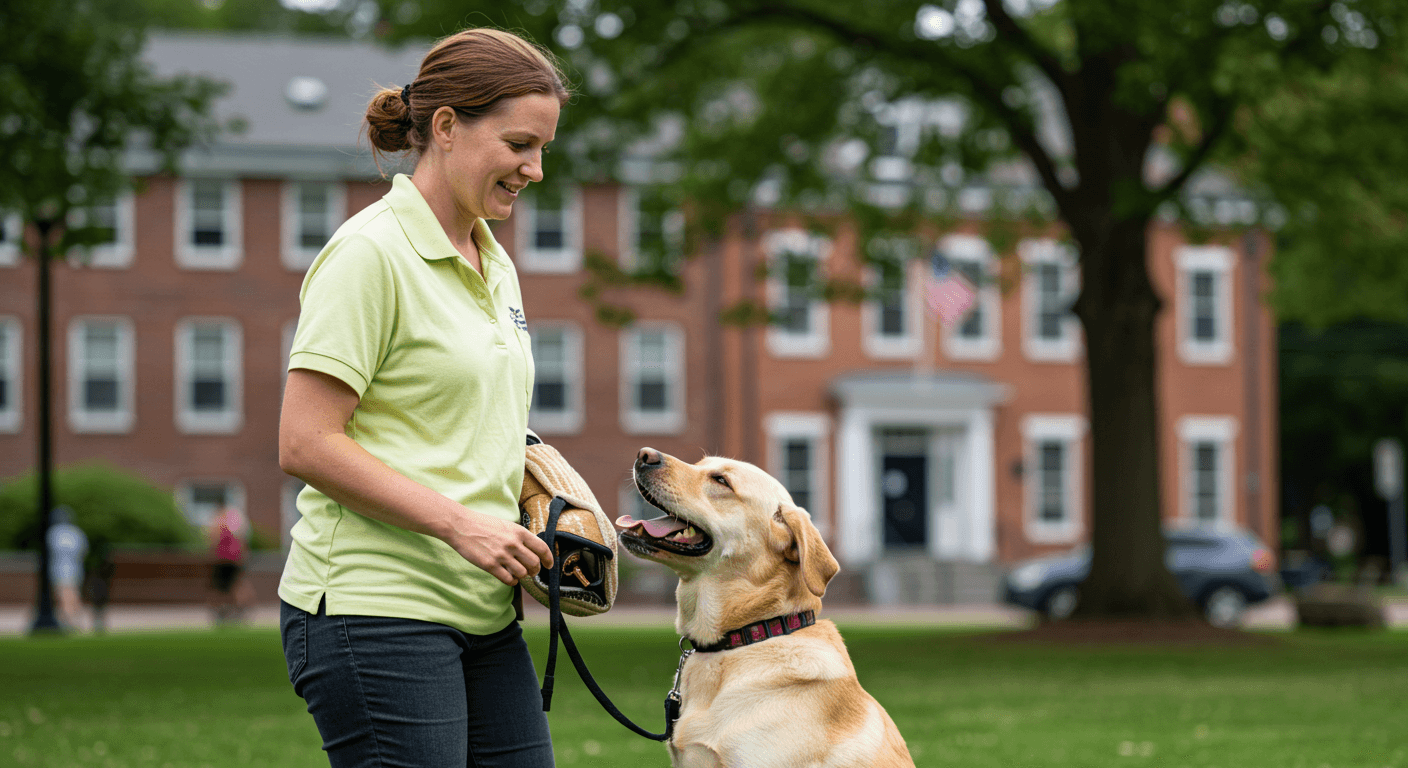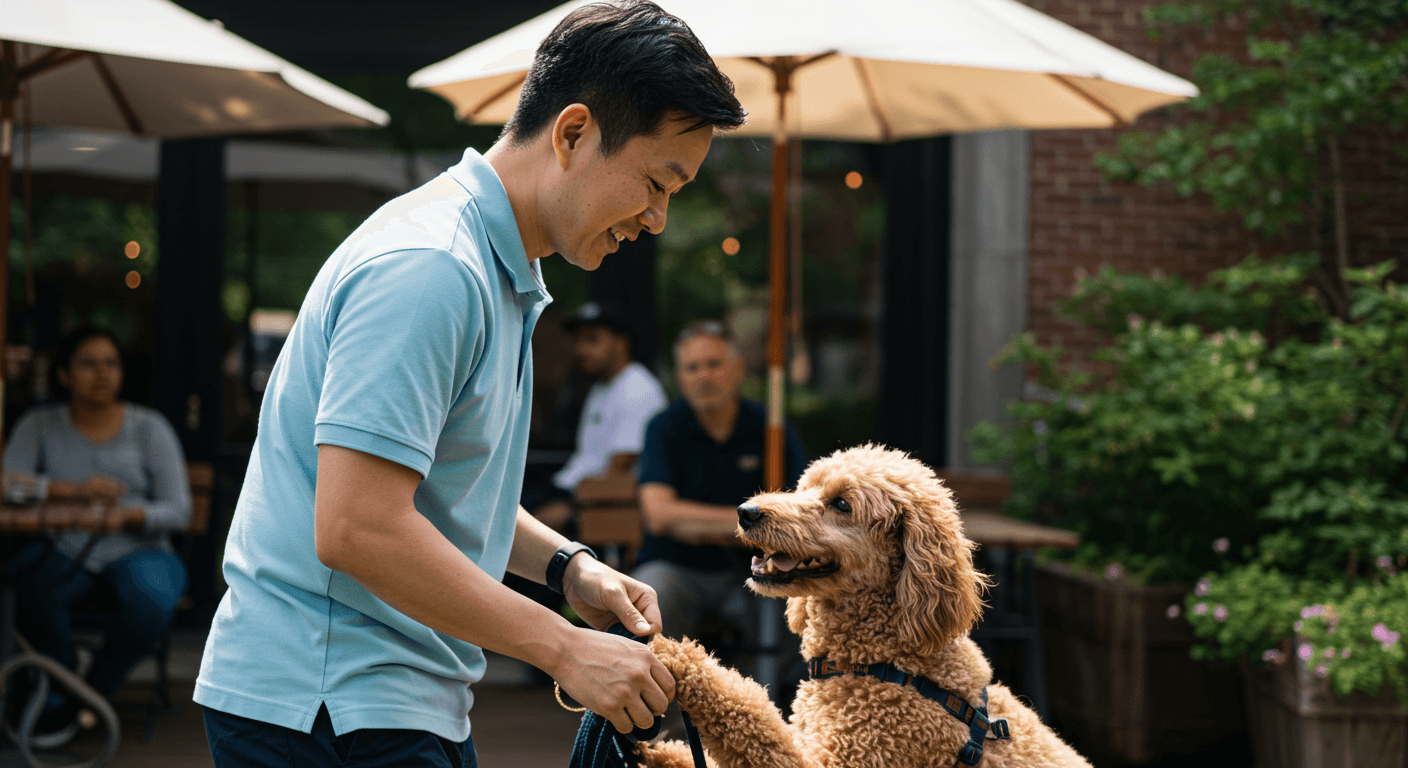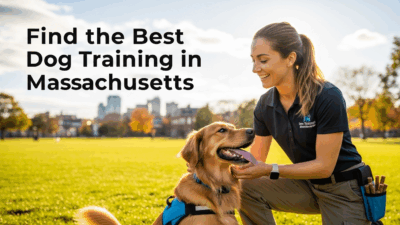Your Complete Guide to Choosing a Dog Trainer in Massachusetts
Finding the right professional dog trainer in Massachusetts means understanding both your dog’s needs and the unique environment you’ll be navigating together. Whether you’re walking through Boston Common, hiking trails in the Berkshires, or strolling along Cape Cod beaches, your dog needs reliable skills that work in real-world situations.
Massachusetts has specific rules about dog ownership that affect training priorities. State law requires dogs to be under control in public, and many towns have strict leash laws and noise ordinances. Working with someone who knows these local requirements will help you build a well-behaved dog that fits comfortably into Massachusetts life.
How to Choose the Right Trainer
Start by looking for someone who uses positive reinforcement training and can create a plan that matches your daily routine. Your dog should learn to handle crowded city sidewalks, stay calm around other dogs at farmers markets, and respond reliably when off-leash in permitted areas.
Credentials help you evaluate a trainer’s education and experience quickly. Common dog trainer certifications include KPA-CTP, CPDT-KA, or IAABC-CDBC for behavior problems. If your dog shows serious aggression or fear issues, look for someone with CBCC-KA credentials or a science-based program like CTC.
In-home dog training works especially well for puppy training, door manners, and neighborhood leash skills. Group classes make sense once your dog can focus around distractions, and they provide essential socialization opportunities.
Board and train programs can jumpstart results, but make sure you understand how the trainer will teach you to maintain those skills at home. Private lessons give you the most flexibility to work on specific problems like reactivity or separation anxiety.
Common Dog Training Methods Explained

Positive reinforcement methods build trust while creating lasting behavior changes. These approaches also help you meet Massachusetts legal requirements for keeping dogs under control without resorting to harsh corrections.
Basic obedience covers sit, down, stay, place, recall, and leash training so your dog can handle everyday situations calmly. These foundation skills matter whether you’re in a densely packed urban neighborhood or a quiet rural town.
Puppy classes focus on socialization, potty training, bite inhibition, crate comfort, and early manners. Starting young prevents problems from developing and helps puppies adjust to the sights and sounds of Massachusetts life.
Behavior modification addresses fear, aggression, resource guarding, or anxiety through careful desensitization and counterconditioning. For serious cases, ask whether your trainer collaborates with veterinary behaviorists.
Dog training classes offer structured group learning where your dog practices good manners around other dogs and people. The best classes screen participants carefully, give dogs enough space, and emphasize calm behavior over excitement.
Service dog training and therapy dog training require extra structure, public-access skills, and clear benchmarks for progress. These specialized training programs need trainers with specific experience in those areas.
Skip any trainer who relies on fear, intimidation, or physical corrections. Humane methods are safer, more effective long-term, and help you follow Massachusetts animal welfare laws.
Average Cost of Dog Training in Massachusetts (Updated for 2025)
Prices across Massachusetts vary based on location, trainer experience, session length, and whether training happens in your home or at a facility. Urban areas like Boston and Cambridge tend to run higher than rural communities in Western Massachusetts.
| Service Type | Average Cost (Massachusetts) |
|---|---|
| Puppy classes (4-6 weeks) | $175-$325 total |
| Group obedience classes (4-6 weeks) | $180-$350 total |
| Private lessons (60-90 min) | $125-$225 per session |
| In-home coaching packages (4-6 visits) | $500-$1,100 total |
| Day training (trainer works your dog) | $500-$1,100 per week |
| Behavior consult for reactivity/anxiety (initial) | $175-$300 |
| Board and train (2-4 weeks) | $2,200-$5,000 total |
Expect to pay extra for longer travel distances, especially if your trainer needs to drive from Boston out to the Cape or Berkshires. Aggressive dog training and complex behavior modification typically cost more because they require specialized expertise.
Make sure you understand what’s included in the quoted price, how progress gets measured, and whether the trainer offers a free consultation or free evaluation before you commit.
Questions to Ask a Potential Dog Trainer
- What training methods do you use, and how do you keep training sessions positive and low-stress?
- What credentials do you hold, like KPA-CTP, CPDT-KA, or CPDT-KSA? Do you pursue continuing education?
- How will you customize the training program for my dog’s specific needs and our Massachusetts lifestyle?
- Do you offer in-home sessions, group classes, or day training, and which approach fits my goals best?
- How will we track my dog’s progress and know when to add more distractions?
- What are the total costs, including travel fees, and what’s your cancellation policy?
- Do you carry liability insurance, and can you provide proof?
- For behavior problems, will you coordinate with my veterinarian if needed?
- What should I practice between sessions to help my dog keep improving?
- Can you provide references from clients with similar training goals?
Local Massachusetts Rules and Considerations
Massachusetts has statewide laws that affect how you train and manage your dog in public. Individual towns and cities layer additional requirements on top of state regulations.
Massachusetts General Law Chapter 140, Section 173A requires dogs to be under their owner’s control at all times in public spaces. Most towns interpret this to mean leashed unless in designated off-leash areas. Check your local bylaws for specific leash length requirements, which typically range from four to six feet.
All dogs in Massachusetts must be vaccinated against rabies by six months of age, with boosters as required by state law. You can find current requirements through the Massachusetts Department of Public Health.
Many Massachusetts towns have noise ordinances that cover excessive barking. Work with your trainer on alert barking and separation anxiety before neighbors file complaints with animal control.
Massachusetts does not require dog trainers to hold special licenses or certifications. However, certified dog trainers who choose to pursue credentials demonstrate their commitment to ongoing education. If a trainer offers board and train services, their facility may need to comply with state boarding kennel regulations overseen by the Massachusetts Department of Agricultural Resources.
Some towns require dog licenses through the local clerk’s office. These licenses typically require proof of current rabies vaccination and may carry annual fees.
Local Massachusetts Resources for Dog Owners
These locations give you safe places to practice recall, work on socialization, and provide enrichment for your dog. Always check posted rules and practice good dog park etiquette.
- Boston Common Frog Pond Dog Park in Boston offers a fenced area where you can practice off-leash skills in the heart of the city
- Pilgrim Bark Park in Plymouth provides separate areas for large and small dogs with plenty of space for recall practice
- Peters Park Dog Run in Boston’s South End gives urban dogs a convenient fenced space to work on social skills
- Blue Hills Reservation welcomes leashed dogs on trails throughout this massive state reservation, perfect for building focus around wildlife and other hikers
- Cape Cod National Seashore allows leashed dogs on many beaches during off-season months, offering excellent opportunities for distraction training
The Massachusetts Society for the Prevention of Cruelty to Animals (MSPCA) provides resources on dog ownership, behavior resources, and animal welfare information throughout the state.

FAQs
How much does in-home dog training cost in Massachusetts?
Most trainers charge $125-$225 per in-home visit across Massachusetts, with lower rates in rural areas and higher prices in Boston and surrounding communities. Package deals typically offer better value than single sessions.
Is in-home dog training worth it?
Yes, because you’re addressing problems exactly where they happen. Your trainer can work on door manners, jumping on guests, counter-surfing, and window reactivity right in your home, then step outside to practice leash skills on your actual neighborhood sidewalks.
Can you pay someone to house train your dog?
Absolutely. Many expert dog trainers offer puppy programs that include potty training, crate training, and daily schedules. Day training can speed up the process while teaching you how to maintain consistency.
What is the 3-3-3 rule for dog training?
This timeline helps set realistic expectations for newly adopted dogs: expect about 3 days for decompression, 3 weeks to learn your routines, and 3 months to feel fully settled. Good training plans work with this natural adjustment period rather than rushing progress.
How long will it take to reach my training goals?
Most puppies and friendly adult dogs show solid progress within 4-8 weeks with consistent practice. Fear, reactivity, or aggression typically requires several months of careful behavior modification with gradual increases in difficulty.
What should I bring to group classes?
Pack a flat collar or harness, a 4- to 6-foot leash, high-value treats, water, and current vaccination records if requested. Leave retractable leashes at home for safety reasons.
What’s the leash law in Massachusetts?
Massachusetts General Law requires dogs to be under their owner’s control in public. Most towns enforce this through leash laws that require 4- to 6-foot leashes in all public areas except designated off-leash zones. Check your local bylaws for specific requirements.
Do I need a dog license in Massachusetts?
Most Massachusetts cities and towns require annual dog licenses through the local clerk’s office. You’ll need proof of current rabies vaccination to obtain a license. Contact your town or city clerk for specific requirements and fees.
What shots does my dog need in Massachusetts?
Massachusetts law requires rabies vaccination for all dogs by six months of age. Your veterinarian may also recommend distemper-parvo, bordetella, leptospirosis, and Lyme vaccines based on your dog’s lifestyle and exposure risk.
Are dog trainers required to be licensed in Massachusetts?
No. Massachusetts does not require specific licenses or certifications for dog trainers. However, trainers who offer boarding as part of board and train programs may need to comply with state boarding kennel regulations through the Department of Agricultural Resources.
Where can I practice off-leash recall in Massachusetts?
Use fenced dog parks or private property where you have permission. Public lands managed by the Massachusetts Department of Conservation and Recreation require leashes unless otherwise posted. Some towns have designated off-leash hours at certain parks.
Which dog parks allow training around Massachusetts?
Most fenced dog parks throughout the state welcome training for dogs, though commercial trainers may need permits for group sessions. Boston Common Frog Pond Dog Park, Pilgrim Bark Park in Plymouth, and Peters Park Dog Run in Boston all provide safe spaces for practice.
What beaches or trails allow dogs for training?
Cape Cod National Seashore permits leashed dogs on many beaches during off-season months, typically from September through May. Blue Hills Reservation, Middlesex Fells Reservation, and Mount Greylock State Reservation all welcome leashed dogs on trails year-round. Always check current regulations before visiting, as rules change seasonally.
How do I find a certified dog trainer in Massachusetts?
Look for credentials like KPA-CTP, CPDT-KA, or IAABC-CDBC when searching for a professional dog trainer. These certifications require passing rigorous exams and demonstrate commitment to science-based, humane training methods. Ask potential trainers about their education and ongoing professional development.
What should I do if my dog shows aggression?
Contact a certified dog trainer with specific experience in behavior modification right away. Look for credentials like CBCC-KA or IAABC-CDBC. Your veterinarian can also help rule out medical causes and may refer you to a veterinary behaviorist for complex cases.
The right combination of skilled training, consistent practice, and understanding of Massachusetts regulations will help your dog become a confident, well-behaved companion. Whether you choose dog obedience training, specialized behavior work, or ongoing dog training services, investing in professional help sets you and your dog up for long-term success throughout the Bay State.
